This is the new era of SEO.
Today, brand visibility inside language models matters more than backlinks.
According to recent studies, models like ChatGPT, Google AI Overviews, and Gemini have already started including brand mentions in 26% to 39% of their responses.
If your brand is cited in these answers, you stand a better chance of gaining higher rankings in search and also improving direct traffic.
But what exactly are AI brand mentions? Simply put, they are references to your brand name made by language models in their responses.
In 2026, the main focus of your off-page SEO should be on growing these AI brand mentions so that models recommend your blog or product more often than others.
In this guide, we will go through the exact steps to increase AI brand mentions and also show you how to track them with ease.
Let’s get started.

Table of Contents
What Are AI Brand Mentions?
In simple terms, AI brand mentions are references to your “brand” appearing inside the outputs of Large Language Models [LLM] and search assistants. They are also called LLM Mentions.
For example, if someone asks, “What is the best tool to optimize keywords for search?” and the generated response includes Semrush or Ahrefs, those are brand mentions.
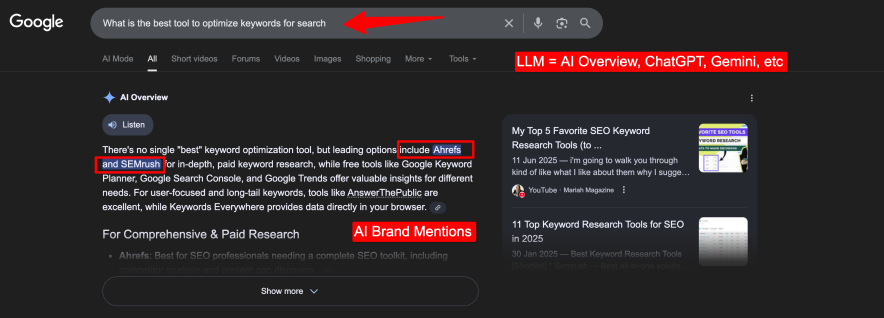
Unlike traditional brand mentions on platforms like blogs, news sites, or social media, these occur within AI-generated summaries that often appear directly in search results.
Because users may not even scroll further after reading the AI answer, being included in these references enhances the search visibility of a brand.
Before diving into this article, get a quick understanding of SEO vs. AEO vs. GEO; it will help you understand AI Mentions much better.
Why Do They Matter?
You may wonder 🤔…the benefits for a brand to appear in LLM models (ChatGPT, Google AI Overview, etc)?
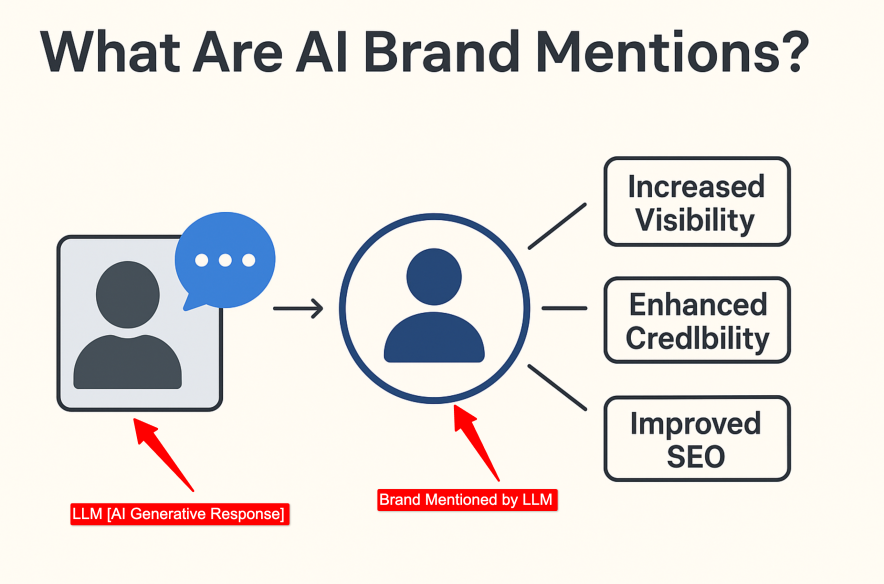
Well, AI brand mentions bridge the gap between authority signals and user trust in an era (2026 SEO) where generative search is front and center.
They are not about who links to you, but about whether search engines and assistants consider your brand trustworthy enough to include in their answers.
Impact on Search visibility:
If your brand is consistently mentioned in AI Overviews or assistants like AI Overviews, you’re more likely to capture clicks through “AI citations” in a situation when users want to “verify” the recommendation or explore the content further.
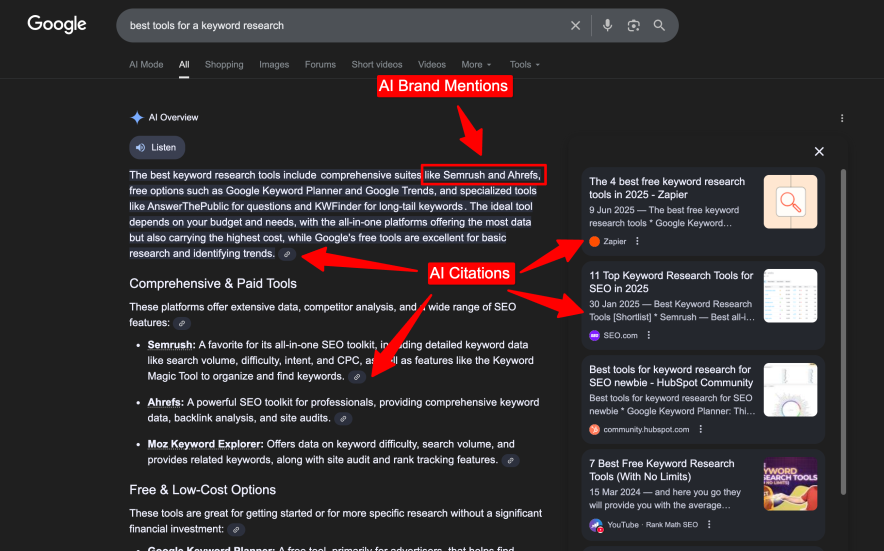
SEO Evolution:
Being named alongside leading competitors positions your brand as credible.
Obviously, when a user sees your brand name appear as an AI citation, they will likely remember it and even search directly by typing your brand name in the search box.
This signals Google and other search engines that your brand is highly trustworthy, and ultimately, it will have a positive impact on your overall site SEO.
Backlinks remain valuable, but brand mentions inside generative search results are becoming a new layer of off-page credibility.
That’s the new truth for all of us who are still playing in the SEO field.
Enhance E-E-A-T Signals:
We all know that if your website page aligns with EEAT (Expertise, Experience, Authoritativeness, and Trustworthiness) factors, then the chances of your page ranking in Google are higher than other players.
Being consistently cited by generative systems is a strong signal of authority. In other words, it improves the EEAT and hence SEO Rankings.
Over 87% of SEOs use AI to create blog posts. Explore more insights like this in our AI SEO Statistics guide.
Backlinks vs AI Brand Mentions: A Comparison & OFF-Page SEO Evolution
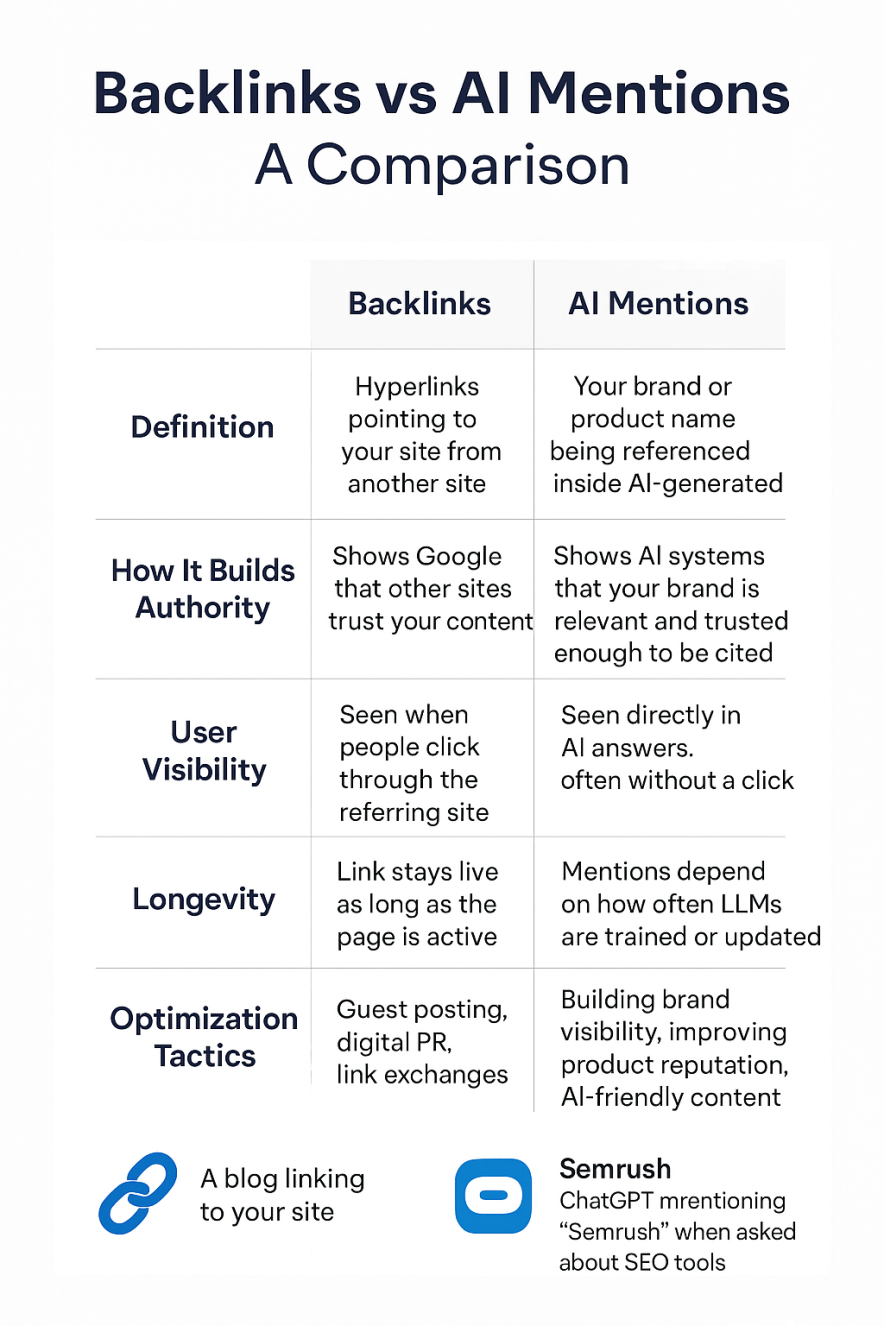
In 2026, Search engines will integrate large language models (LLMs) into their results, and hence, backlinks will no longer be the only marker of trust.
AI systems now generate responses by pulling patterns, facts, and brand names from vast datasets.
When your brand is included in those generated summaries, it signals credibility in a way that goes beyond traditional linking.
This is the foundation of AI Brand Mentions SEO — a shift from counting links to analyzing how often and where your brand is named in machine-generated answers.
Because of the launch of Generative models like Google AI Overviews, the user behaviour is also changing.
More people are reading AI summaries directly without clicking further, so visibility inside the summary itself matters.
👉 In short: Backlinks give your website “votes,” while AI mentions give your brand “recognition.” Both are valuable, but the second is becoming critical in how search engines decide which brand names to show in AI answers.
How to Increase AI Mentions of Your Brand?
What to do so that your brand appears more in the answers, summaries, content, etc, generated by LLM models like ChatGPT, Google AI Overviews, Gemini, and more.
For this, you have to figure out how to rank in Google AI Overviews. Yes, this is the new, present, and the future of SEO.
Well, it’s been only 4 months since AI mode was launched by Google, and learning of Google AI Overview ranking is still ongoing.
Lot’s of big companies, independent creators, are experiencing and sharing their own views on AI Brand Mentions visibility but a 100% success rate can only be seen when you are actually implementing the strategies.
Ahrefs analyzed 75,000 brands and created a report that highlights 11 search factors which help increase brand visibility in AI overviews.
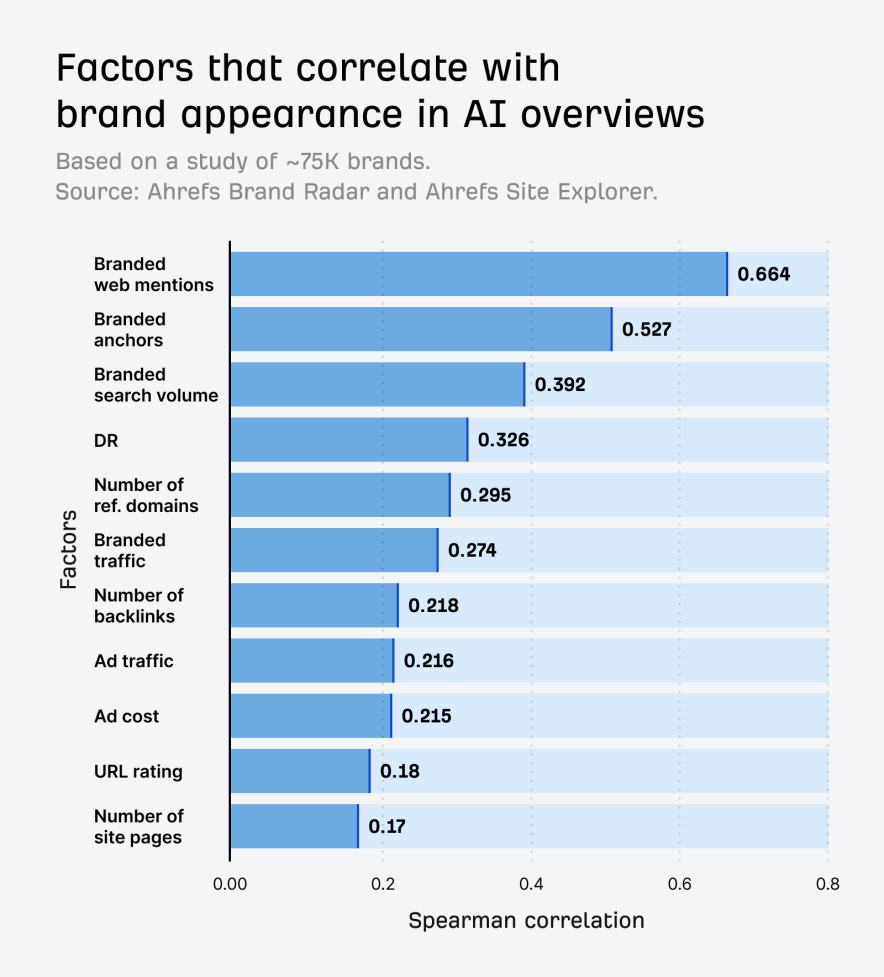
“Branded Web Mentions”, “Branded Anchors”, and “Branded Search Volume” holds the highest weightage….
Now the big question is, how do we optimize our site for these factors in SEO?
Here are the most effective ways to increase your brand chances of being mentioned in LLM results:
1. Checklist to Boost Brand Mentions, Branded Anchors, & Search Volume:
Publish Data That Others Will Cite:
LLMs are trained on huge datasets, including news, blogs, and reference sites. The more your brand is cited in high-authority contexts, the more likely it is to appear in generated summaries.
- Invest in digital PR campaigns to land mentions in reputable outlets.
- Contribute guest articles, research reports, or expert quotes.
- Create original studies, surveys, or benchmarks. People love quoting unique numbers in blogs, news, and presentations.
- Example: Backlinko’s “Google ranking factors study” gets linked and mentioned everywhere.
Collaborating with Influencers and Podcasts is the Best Thing:
Experts who are frequently quoted online can indirectly boost your visibility in AI mentions. If influencers mention your product in content that LLMs train on, your brand has a better chance of surfacing.
Search about your niche on top social platforms, including Instagram, YouTube, etc, and see who is leading. Try to make a good deal with an Influencer.
Optimize for More Brand Recognition:
AI systems rely on entity recognition to connect brands with topics.
- Make sure your brand has a Knowledge Panel (via Google Business Profile, Wikipedia, or Wikidata).
- Use structured data markup so search engines understand who you are and what you offer. (Use Rank Math free tool for this)
- Align brand name, tagline, and product categories consistently across platforms, including blog and social.
- List your brand on high quality directories
Expert Tips Should be Consistent:
- Share expert tips on LinkedIn, X (Twitter), and niche forums.
- When people remember your brand for insights, they naturally search it up.
- Example: Neil Patel often drops short SEO insights on LinkedIn → boosts searches for “Neil Patel.”
Encourage Branded Queries in CTAs:
- End content with prompts like: “Google [Your Brand + Product] to see how it works.”
- It trains users to search for your brand name directly. It will enhance the branded traffic.
- Example: Podcasts often say, “Search [Brand Name] on Google to learn more.”
Active on Social Forums Like Reddit for Opinion-Based Topics:
LLM or AI Overviews often rely on user-generated content because it captures real opinions and experiences. This is why platforms like Reddit, Quora, and niche forums show up frequently in search results.
When people mention your brand in these spaces, it improves the chances of being highlighted.
You simply need to participate in Reddit discussions by answering questions and sharing valuable insights in communities related to your field of interest. According to Reddit Stats, the platform has over 416.4 million weekly active users, making it one of the largest online discussion hubs.
Approach to What Already Cited:
Obviously, for your search query the LLM must have cited a high-quality site. You can reach out to that site and ask them to include your product or brand. There is no study yet that proves how successful this strategy is, but it is still worth trying. It can also support your link building efforts.
2. Content Plan to Grow AI Brand Mentions:
Everything depends on the content. Isn’t it?
Well, with the introduction of LLM, the whole content plan was impacted. Now, every content type you publish should either make people talk about your brand, link to your brand, or search for your brand.
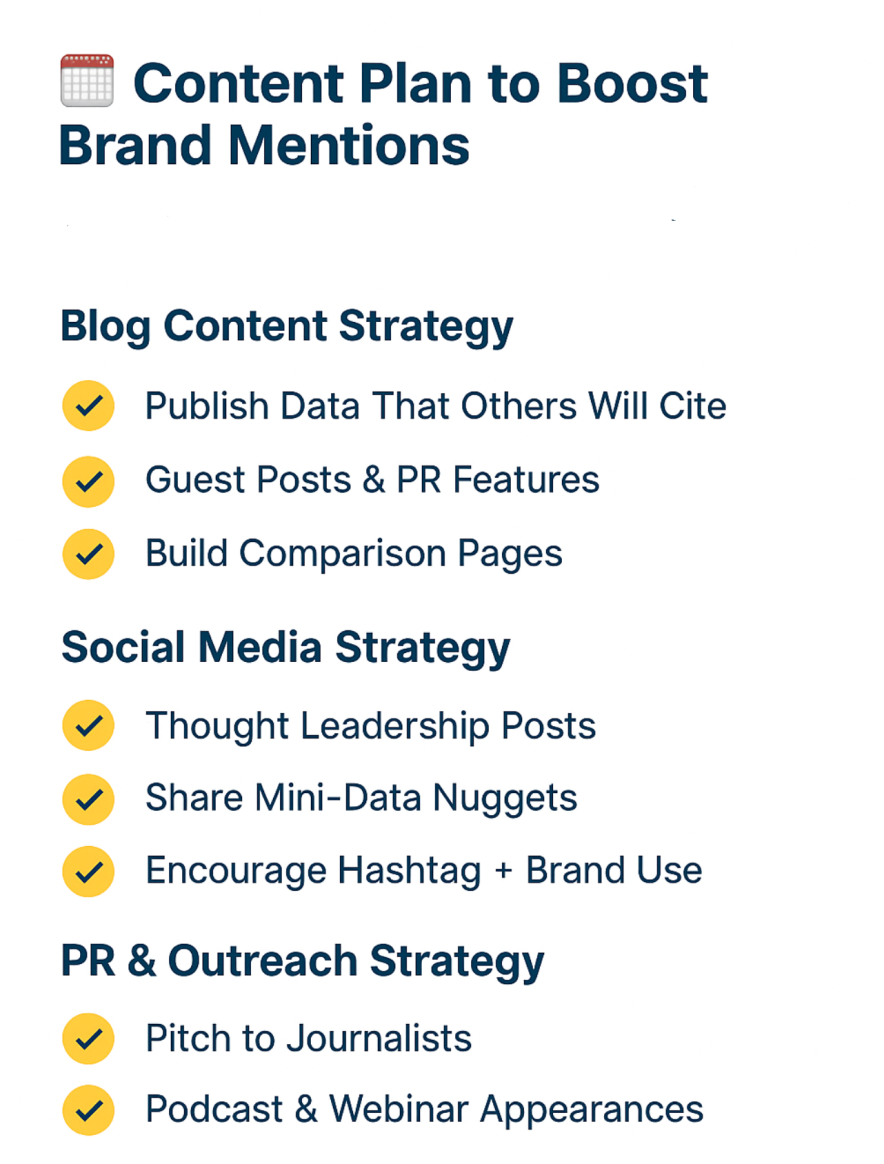
Blog Content Plan:
1. Publish Data Driven Strategies:
- Write articles with stats, surveys, or original research.
- People love quoting stats → this brings backlinks and brand mentions.
- Example: “2026 State of SEO Trends Report by [Your Brand]” → Bloggers cite “According to [Your Brand]” → creates branded anchors.
2. Create Comparison Pages:
- Write posts like “[Your Brand] vs Competitor: Which Tool Fits Your Business?”.
- People searching for comparisons will find your brand → increases branded search volume.
- Example: “Semrush vs Ahrefs: Detailed Comparison” ranks for branded queries.
3. Expert Guides & Tutorials:
- Publish step-by-step how-to guides tied to your niche.
- Mention your brand naturally as part of the solution.
- Example: A guide on “How to Track AI References in SEO” → naturally highlights Semrush AI Toolkit.
4. Brand Specific Posts:
How will LLMs know what your brand is and what type of business you run?
For that, you need to create content that is specific to your brand.
For example, if I own an SEO tool like Semrush, I should publish dedicated tutorials, guides, and videos in addition to blog posts.
When this information is available, language models are more likely to explain your brand to users and show that your business can also solve their queries.
Social Media Content Strategy:
1. Thought Leadership Posts
- Share short, valuable tips with your brand name included.
- Over time, people search for your brand just to get more insights.
- Example: Neil Patel posts tips → people Google “Neil Patel blog.”
2. Share Mini-Data Nuggets
- Post quick stats from your research on LinkedIn/Twitter.
- Journalists and bloggers may pick it up → brand mentions.
- Example: “43% of marketers say AI mentions will become the new backlinks – [Your Brand Research].”
3. Encourage Hashtag + Brand Use
- Create branded hashtags that users can post with.
- More visibility → more brand searches.
- Example: Canva’s #CanvaDesignChallenge → boosts brand awareness and mentions.
Bonus Read: Check out the detailed post on ‘Generative Engine Optimization,’ which can genuinely help improve AI mentions.
How to Track AI Brand Mentions?
I guess by now you have a clear idea of what AI Brand Mentions are.
Feel free to drop your questions in the comments; I’d be happy to answer them.
That said, even if you apply all the optimizations, how will you know whether tools like ChatGPT or AI Overviews are actually including your brand in their responses?
As of now, even Google Search Console does not show how many impressions your site gets through AI overviews.
There are 2 Methods to Track AI Brand Mentions:
1. Via Google Analytics:
Check and compare the growth of direct traffic from now to the past 3 or 6 months. If there is an increase, then it is a good sign for your brand mentions.
2. Via Semrush AI Toolkit:
I have been using the Semrush AI toolkit for a couple of months to track & monitor my Blog visibility on different LLMs, including Google AI Overviews, ChatGPT, etc.
Well, the good thing is you can buy the AI toolkit separately for just $99/month
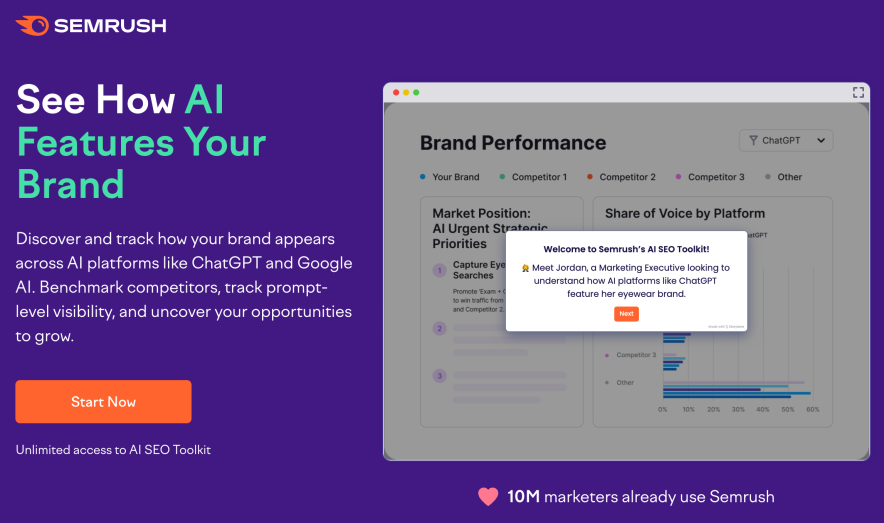
Let me show you the exact process for tracking AI brand visibility in Semrush.
Before checking out the AI toolkit in Semrush, start with the Domain Overview report. You will now notice a new AI Visibility widget that shows how many times your brand is mentioned in language models compared with your top competitors.
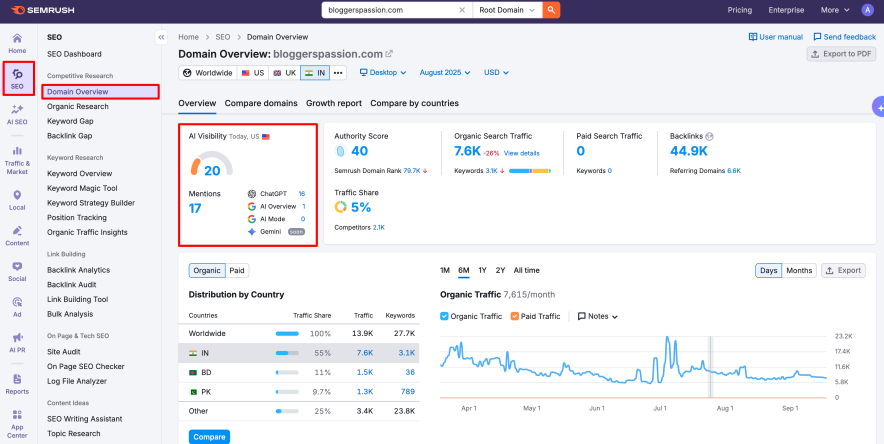
This gives you a quick way to measure brand visibility in AI results.
Keep in mind, you need access to the Semrush SEO toolkit to view the Domain Overview report. The SEO toolkit is the foundation of Semrush and includes all the main SEO features.
Now, to have a detailed look, “AI SEO” toolkit is the tab you have to open from the left sidebar.
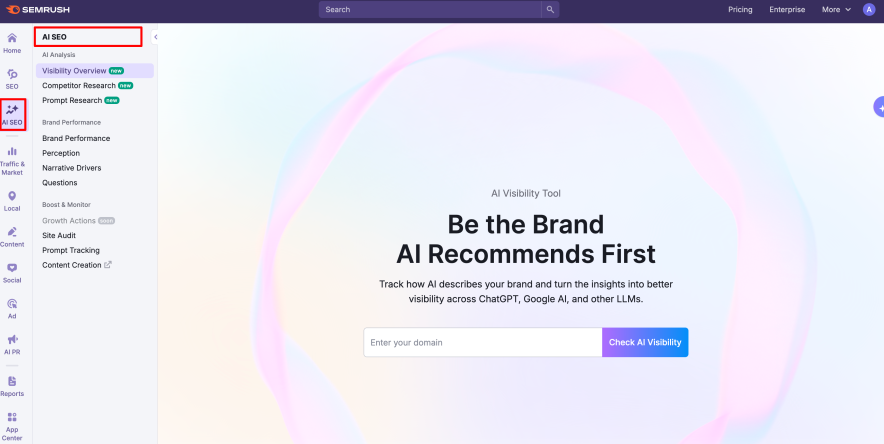
There are plenty of powerful tools available in this AI toolkit.
Now, to track Brand visibility, you have to input your domain URL in the “Visibility Overview” tool.
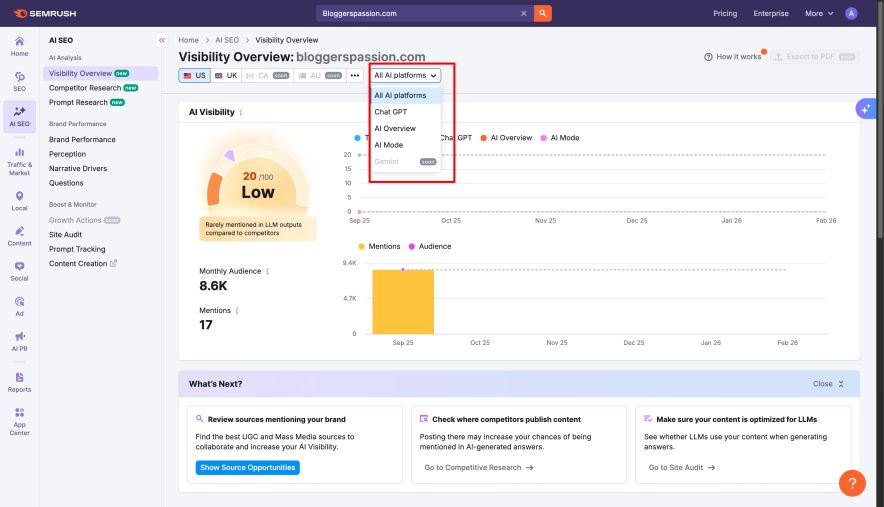
The report will show your brand’s visibility ratio compared with the total audience size. You can also filter the data by country.
As you scroll down, you will find more detailed insights about your AI brand mentions, such as:
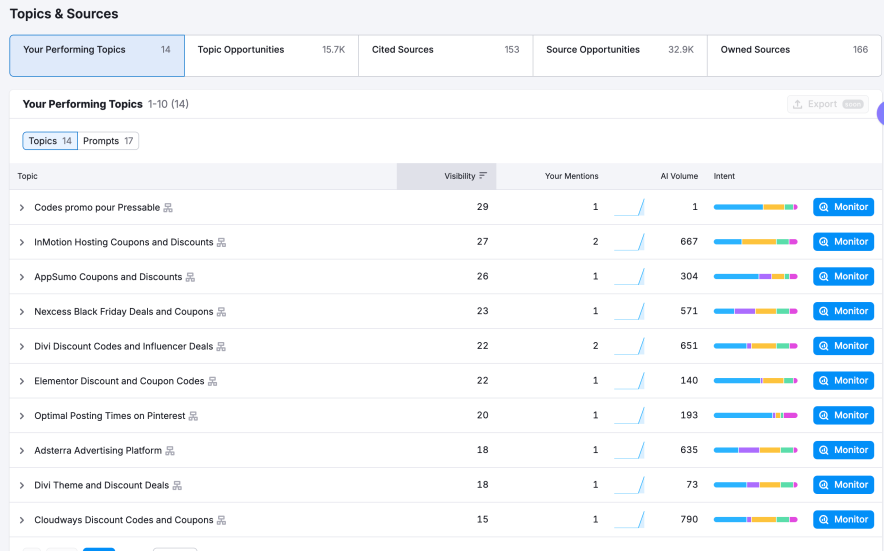
Semrush gives you:
- Your Performing Topics – topics where your brand is already being mentioned in LLMs
- Topic Opportunities – prompts and topics where you can create content to increase mentions
- Cited Sources – websites where your brand is already listed
- Source Opportunities – websites where you could plan to get your brand cited
- Owned Sources – your own domain pages that appear in AI generated results
To track AI Brand mentions in a particular prompt, you have to use the monitor button.
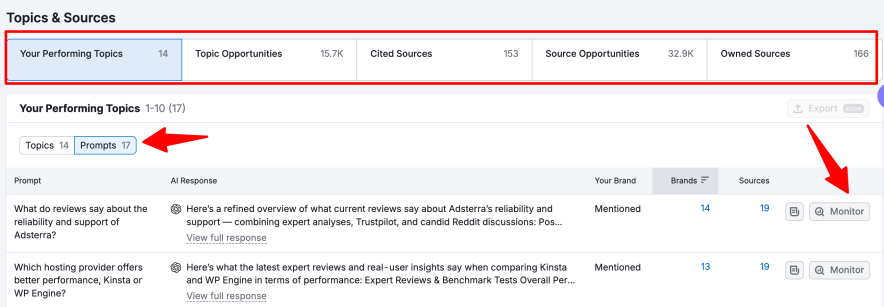
You can either choose a particular AI Prompt from the above report or you can input your own. Then you have to define the LLM where you want to enable tracking. AI Mode is fully supported here.
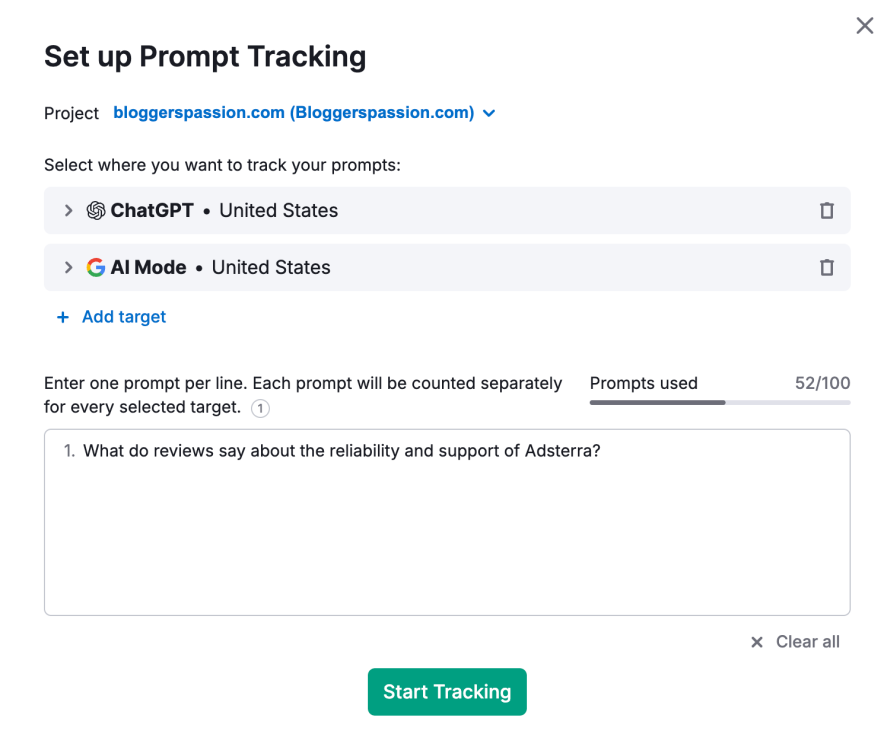
So this is how you can quickly enable AI Brand tracking.
Once tracking is enabled, you can navigate to the Position Tracking tab where Semrush tracks your Brand for specified prompts.
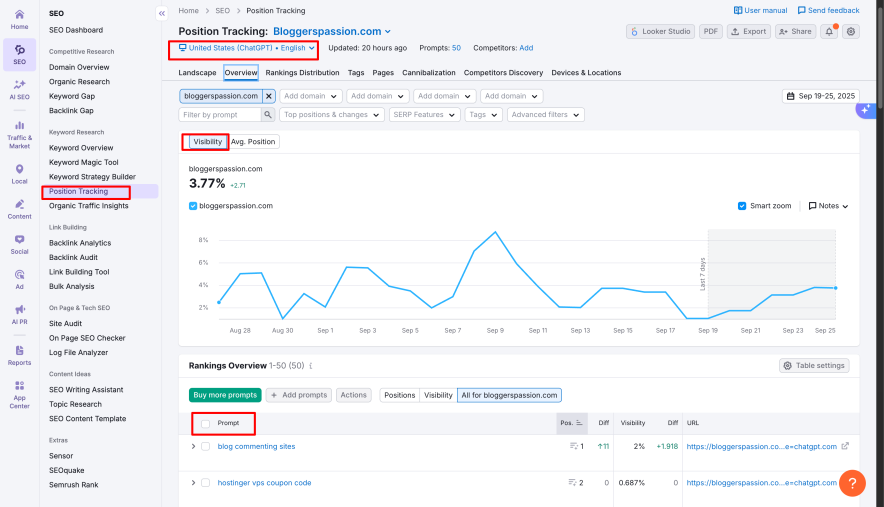
Now, if you own a SEO toolkit, then you can also track your top keywords for AI overviews visibility.
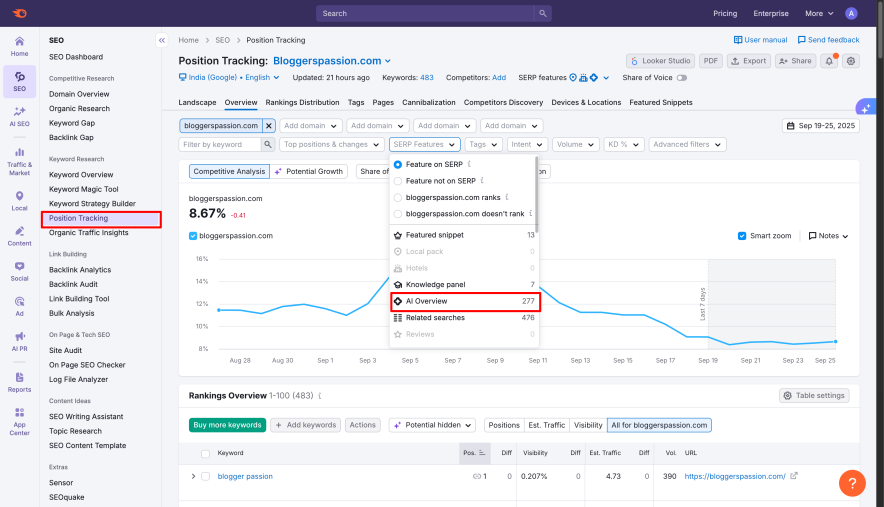
Beyond AI tracking, you can do a lot in Semrush. They have a dedicated Competitor research tool where you can discover huge opportunities of AI brand mentions you are missing.
I’d definitely advise you to try Semrush SEO toolkit (14 Days trial) and AI toolkit ($99/month) to enhance your new era SEO strategy in 2026.
Final Words:
Backlinks once defined online authority. They are still valuable, but no longer the only factor that matters.
With the launch of search assistants and language models, brand mentions inside their answers are becoming a new layer of brand authority in AI Search.
When your brand is consistently referenced in these responses, you gain visibility, trust, and authority at the exact moment users are looking for solutions.
It’s about remaining relevant in a search experience where AI answers often appear before a list of links. Brands that act early can position themselves as the natural choice inside these results, much like the first movers in link building did in the early days of SEO.
FAQs:
What are AI brand mentions in LLM?
AI Brand mentions are references to your business name that appear inside summaries or answers given by LLMs like ChatGpt and Google AI Overviews. For example, if someone asks for the best SEO tools and the response includes “Semrush” or “Ahrefs,” those are brand mentions.
Why are brand mentions important for SEO in 2026?
Because user behavior has shifted. People often rely on quick summaries shown by search engines. If your brand is included there, you gain visibility, authority, and more direct searches. This improves your trust signals and can support higher rankings over time.
Will brand mentions affect E-E-A-T (Expertise, Experience, Authoritativeness, Trustworthiness)?
Yes. If your brand is consistently referenced by search assistants, it signals authority and reliability. This strengthens E-E-A-T factors, which are key for higher search rankings.
![11 Best AI SEO Tools To Use In 2026 [Free & Paid Top Picks]](https://bloggerspassion.com/wp-content/uploads/2025/09/ai-seo-tools.webp)


